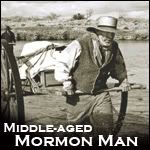 Crossing the Wilderness with Lehi
Crossing the Wilderness with LehiIn the first several chapters of 1 Nephi, Lehi is commanded of the Lord to take his family and leave Jerusalem, leaving behind all their worldly possessions and finery. Laman and Lemual were quite unhappy about leaving behind their inheritance and the life they enjoyed. They must have been content. Life was good. But the Lord had other plans for them. The family had to leave the life they knew and loved and go into the wilderness. According to the Lord, it was time for a change. In 1 Nephi 2:20, Lehi had been assured of the Lord that they would be led to “a land of promise…a choice land above all other lands,” but they had to go through a wilderness to get there.
As we read further into the chapters of their wilderness, we learn that Nephi had faith in the Lord and turned to his father, the Prophet Lehi, for guidance. He led his brothers by persuasion, and tried to remind them of the feats of Moses under the direction of the Lord while in his own wilderness. The Liahona, which guided them, worked according to their faith and diligence. We learn that not only did they have to cross a wilderness, they “did travel and wade through much affliction,” (1 He 17:1) while doing so. Now, some grumbled the whole way, not learning anything about faith, the love of their God or even noticing the great blessings set upon them in their journey. Many kept looking back to Jerusalem, as the Israelites kept looking back to Egypt, wishing for their old life back, not looking to the Promised Land ahead of them.
Consider, my friends, the times of wilderness in your own lives, the times when the Lord may have a change in mind for you. How do you (or will you) handle the crossing before you reach the

Promised Land that awaits you? Will you be ever faithful as Nephi, not grumbling, as did Laman and Lemuel, always looking back? Will you become stronger?
Nephi professed to have “been highly favored of the Lord,” knew he was loved, and acknowledged “having seen many afflictions” (1 Ne 1:1) in his life, but he also wanted us to see, that despite frightening afflictions, “I, Nephi, will show unto you that the tender mercies of the Lord are over all those whom he has chosen, because of their faith, to make them mighty even unto the power of deliverance..” (1 Ne. 1:20)
Elder Bednar taught in the April 2005 General Conference that “chosen” is not an exclusive status, given only to a restricted few, and that God does not have a list of favorites. “I testify that the tender mercies of the Lord are available to all of us and that the Redeemer of Israel is eager to bestow such gifts upon us.” He taught that we determine if we are chosen. ”Rather, it is our hearts and our aspirations and our obedience which definitively determine whether we are counted as one of God’s chosen.”
As we read in the Book of Mormon, we see the afflictions the people endured, but consider the tender mercies of the Lord upon the people as they turned to Him in prayer. When the people of Alma were taken into captivity (Mosiah 23-24), they poured out their hearts unto Him. They were counseled to be of good comfort, that they would be delivered, “And I will also ease the burdens which are put upon your shoulders, that even you cannot feel them upon your backs, even while you are in bondage.” Evidences of tender mercies are before our eyes.
As we read the scriptures and apply them to our lives, we see examples of tender mercies everywhere. As we are worthy to receive these same tender mercies we read about, we learn that the Lord will sustain and support us through our trials. He will warn us of impending danger, He will enlighten us, He will strengthen and deliver us, He will shield us, He will change our nature, He will give us peace and joy, He will encircle us in the arms of His mercy. (Ensign, April 2000, Remember How Merciful the Lord Hath Been).
We all have our wilderness to cross. How will you get through yours? Will you experience the tender mercies, notice them?


















